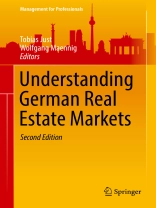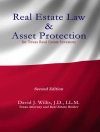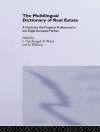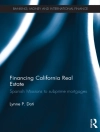In this book, experts discuss how German real estate values have remained stable throughout the financial crisis, even though transaction volumes have been very volatile since 2005. Consequently, risk-averse national and international investors have started to invest in virtually all German real estate asset classes. This book tries to answer what has made the German real estate markets more resilient to shocks than many European real estate markets by analyzing the economic, regulatory and demographic environment. In 30 well-structured chapters, experts from both the academic and professional world analyze structural and current issues of German real estate markets. Readers will get a deep understanding of what makes the German real estate market special and where potential opportunities and threats in Europe’s largest real estate market exist.
Daftar Isi
Macro Environment: Real Estate Data Sources in Germany.- Size and Impact of Real Estate Sector and Its Role for Business Cycles and Growth.- Demographic Outlook and the Implications for Real Estate Markets.- Germany’s Regional Structure.- The German City System.- The Micro-Cosmos of German Cities.- Sustainable Buildings.- Judical Framework: Regulations and Laws on Real Estate Agents, Notaries, Cadastres and Rent Increases.- Legal Framework for Real Estate Asset Classes.- Valuation of Real Estate in Germany.- What Germany’s Amended Tenancy Laws Do – and What They Don’t.- Commercial Leases.- Planning and Building Law.- Tax and Subsidy Framework: Tax Framework for Investing by Asset Classes.- German Taxation of Inbound Real Estate Investments.- Monument Protection and Zoning.- Financing and Investment: Commercial Property Financing.- Going Public and M & A in the German Real Estate Market.- German Open-End Real Estate Funds.- German Closed-End Funds.- REOCs and REITs.- Possible Applications for Derivatives.- Asset Classes: Development of Residential Property.- German Office Markets.- Retail Property Markets.- Hotel Market Germany.- Unternehmensimmobilien – An Asset Class of High Potential.- Ongoing Catch-Up Potential for German Real Estate Returns.- Public Real Estate: Public Real Estate.- PPP and Infrastructure.
Tentang Penulis
PROF. DR. WOLFGANG MAENNIG is Professor of Economics at the Department of Economics at Hamburg University. Before that he was professor at E.A.P. Paris-Oxford-Berlin-Madrid. He was a visiting professor at the American University in Dubai and at the Universities of Stellenbosch (South Africa) and Istanbul, the Federal University of Rio de Janeiro and the University of Economics in Bratislava. He was also visiting scholar at the International Monetary Fund in Washington, DC, and at Deutsche Bundesbank in Frankfurt. His research has been published in numerous academic journals, including Contemporary Economic Policy, Economic Letters, Labor Economics, Regional Science and Urban Economics, Regional Studies, J. of Urban Economics, J. of Economic Geography, Oxford Bulletin of Economics and Statistics, Real Estate Economics, and Transportation Research. Wolfgang Maennig has worked on many occasions as an expert on real estate issues, including projects for the German Ministry of Transport, the Federal Institute for Sport Science, and several German Olympic bid committees. He teaches real estate economics at IRE|BS and on the CREA (Certified Real Estate Investment Analyst) Programme at DVFA.
PROF. DR. TOBIAS JUST is Managing Director at the IRE|BS Immobilienakademie and professor for Real Estate at the University of Regensburg. Tobias studied economics in Hamburg and Uppsala (Sweden). In 1997 he graduated and started to work at the University of the Federal Armed Forces Hamburg. His Ph D-dissertation was awarded the university science prize in 2001. For more than ten years Tobias worked at Deutsche Bank Research, the economics research unit of Deutsche Bank. He headed the units’ sector and real estate research team and was a member of Deutsche Bank’s group wide Environmental Steering Committee. In summer 2006 Tobias was Research Fellow at the American Institute of Contemporary German Studies at the Johns Hopkins University in Washington DC. Tobias published more than 100 papers in professional and academic journals and books. Since November 2011 Tobias has been Managing Director at the IRE|BS Immobilienakademie and has a chair for Real Estate at the University of Regensburg. He is President of the German Society of Property Researchers (gif), editor of the ZIÖ – the German Journal of Real Estate Research and a member of the Executive Management Board of the German section of the Urban Land Institute. In 2013 Tobias was elected “Head of the German real estate industry” by leading real estate journalists, and in 2015 he was ranked among the leading German economists by the FAZ.












